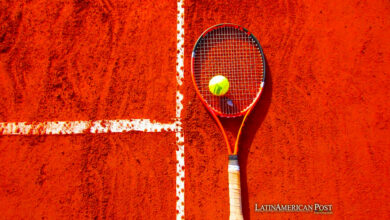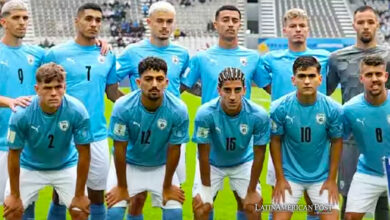Match-fixing: the Silent Enemy of Professional Tennis
The sanction of the tennis player Younes Rachidi for arranging 135 matches reopens the debate around the "white sport"

Photo: AFP
LatinAmerican Post | Juan Felipe Rengifo
Escucha este artículo
Leer en español: Arreglo de partidos: el enemigo silencioso que sigue rondando al tenis profesional
The Moroccan tennis player will go down in history as the most cheater in history. According to reports from the International Tennis Integrity Agency (ITIA) , Rachidi arranged 135 matches throughout his five-year professional career, both in the singles and doubles categories. This meant a lifetime sanction for him to play, train or participate in any tennis event governed by the official tennis bodies, in addition to paying a fine of $34,000.
Cases that Are Not Isolated and Increasingly Worrisome
Despite the fact that his career was not highlighted on the world circuit (his highest position was 473 in the ATP doubles) he was able to represent his country in three editions of the Davis Cup in the 2012, 2013 and 2014 editions. Other players were also affected by the behavior of the African player, specifically the cases of the Algerian tennis players Mohamed Hassan and Houria Boukholda who were also found guilty of the same behavior, since they arranged 29 and 15 games respectively.
The most worrying thing is that although these cases can be considered one of the most serious in history due to the number of matches fixed in valid matches on the ATP circuit, they are not isolated cases. Other tennis players on the professional circuit have also been suspended for corruption cases during his professional career.
A Peruvian Talent Who Fell into Temptation
One of the most remembered cases in Latin America was that of the Peruvian Mauricio Echazú, who in 2022 was suspended after admitting that he had rigged or tried to rig the results of tennis matches and received financial favors in return. The sanction of "Garrita", as he is known in the tennis circuit, shocked his country, because he was one of its most outstanding players and with the greatest projection, he was even called up at just 15 years old to play the Davis Cup playoff against Brazil in 2004. His sanction is expected to be lifted at the end of this year if he is not a repeat offender in this type of crime.
You can also read: María Camila Osorio Makes History in Colombian Tennis
What about the Top Tennis Players?
After he defeated South Korean Hyeon Chung in the first round of the 2016 Australian Open, Novak Djokovic confessed that in 2007 he had been offered $200,000 for losing in the first round of the St. Petersburg tournament. Due to this situation, the Serb decided to decline his participation and thus avoid suspicion. “I was approached indirectly through the people who worked with me at the time. Obviously, we immediately said no. The person who was trying to contact me didn't even come to me directly," "Nole" commented.
The Increment of Digital Betting Houses Aggravates the Situation
According to research that the BBC has been developing since 2016, the issue of match fixing is no longer limited to tournaments of lesser relevance or with little media impact, the findings even reveal that Grand Slam matches at Wimbledon and Roland Garros have been seen affected.
Although none of the possible tennis players involved is mentioned, a 2007 Sopot Tournament match played by Nicolay Davydenko against Martín Vasallo is mentioned. That game would end in the third set, when the Russian withdrew with injury. According to reports, that game moved close to seven million dollars in bets and despite the fact that it produced an investigation by the ATP, there were no sanctions.
Despite the Sanctions, There Is No a Real Solution
With so much flow of money circulating, it is difficult for tennis players not to feel tempted to receive some additional money to ensure their economic future beyond sporting results. On the other hand, and despite the restrictions that players have to participate in betting, these businesses are increasingly making their way into professional sports through sponsorships or subsidies, which makes it even more difficult to eradicate possible acts of corruption.





